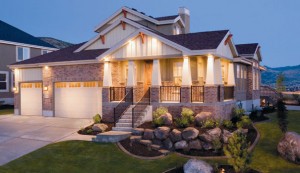Most Common Mortgage Types
 This is a loaded topic, because mortgage “types” can mean a lot of things to different people. But when I speak to people I meet and tell them I am a mortgage professional, the question of what is the “best” or what is the “most common” type of mortgage usually comes up within five minutes. So I figure if that is my experience in my personal life, chances are it is a common question for the general public. So to answer this, I will discuss lending programs and repayment options.
This is a loaded topic, because mortgage “types” can mean a lot of things to different people. But when I speak to people I meet and tell them I am a mortgage professional, the question of what is the “best” or what is the “most common” type of mortgage usually comes up within five minutes. So I figure if that is my experience in my personal life, chances are it is a common question for the general public. So to answer this, I will discuss lending programs and repayment options.
When thinking about the most common mortgage programs, there is conventional, FHA, VA, and the subset of construction loans. Each of these loan options are designed to assist different groups of the American public, and which is “best” is really determined on an individual basis.
Conventional mortgages are the mortgages we were raised hearing about. They generally require a larger down payment than the other options (20%, on average), but can have better financing options, don’t directly involve federal agencies, and generally will have no mortgage insurance. Should you wind up with a conventional mortgage that does have mortgage insurance, it is generally cheaper than FHA mortgage insurance and it will eventually fall off. These mortgages have the most stringent credit and income guidelines, and have the least flexibility from an underwriting standpoint.
FHA mortgages are becoming more and more popular each year. They allow people to buy a house with as little as 3.5% down, and allows people who are credit challenged to buy a home. They are popular because borrowers can expand their budget, or buy a home when they otherwise might have been unable, but they can carry higher costs and interest rates. It’s better to go FHA than not buy a house, because you still see all the benefits of home ownership, but generally you are better off going conventional if you have the option.
VA mortgages are a completely different breed. The VA does not set specific credit guidelines, does not set debt to income ratios, and allows for true 100% financing, meaning you can buy a house with no down payment. These mortgages are only available to veterans, have relatively low closing costs, and have favorable terms. They also offer the most flexibility from underwriting because they are backed by the VA.
Construction loans, or rehabilitation loans, come in two varieties –FHA and conventional. And while the specifics of costs, guidelines, and rates will be different depending upon which program you go with, all construction loans have the same goal in mind: get you into a house that needs some work, and give you the capital to do the work. They are a great option for anyone looking to fix up a house, but are the most onerous from an underwriting standpoint. If you want to go with a construction loan, just be prepared to gather extra documentation, jump through an extra hoop or two, and have your financial life more thoroughly examined. But if you want to go this route, you can end up buying a house and turning it into the home of your dreams. There is certainly something to be said for that.
Any of these mortgage types will get you into the home you want, and really at the end of the day what matters is not the program, but the fees and monthly payment. Next week, I will discuss the different repayment options available for each, and then explain which of these combinations are most common and why.
If you have any questions about these common types of mortgages, or if you would like to see how much house you can afford, please contact me. If you would like to add anything about these loan programs, please leave a comment.

Submit a comment